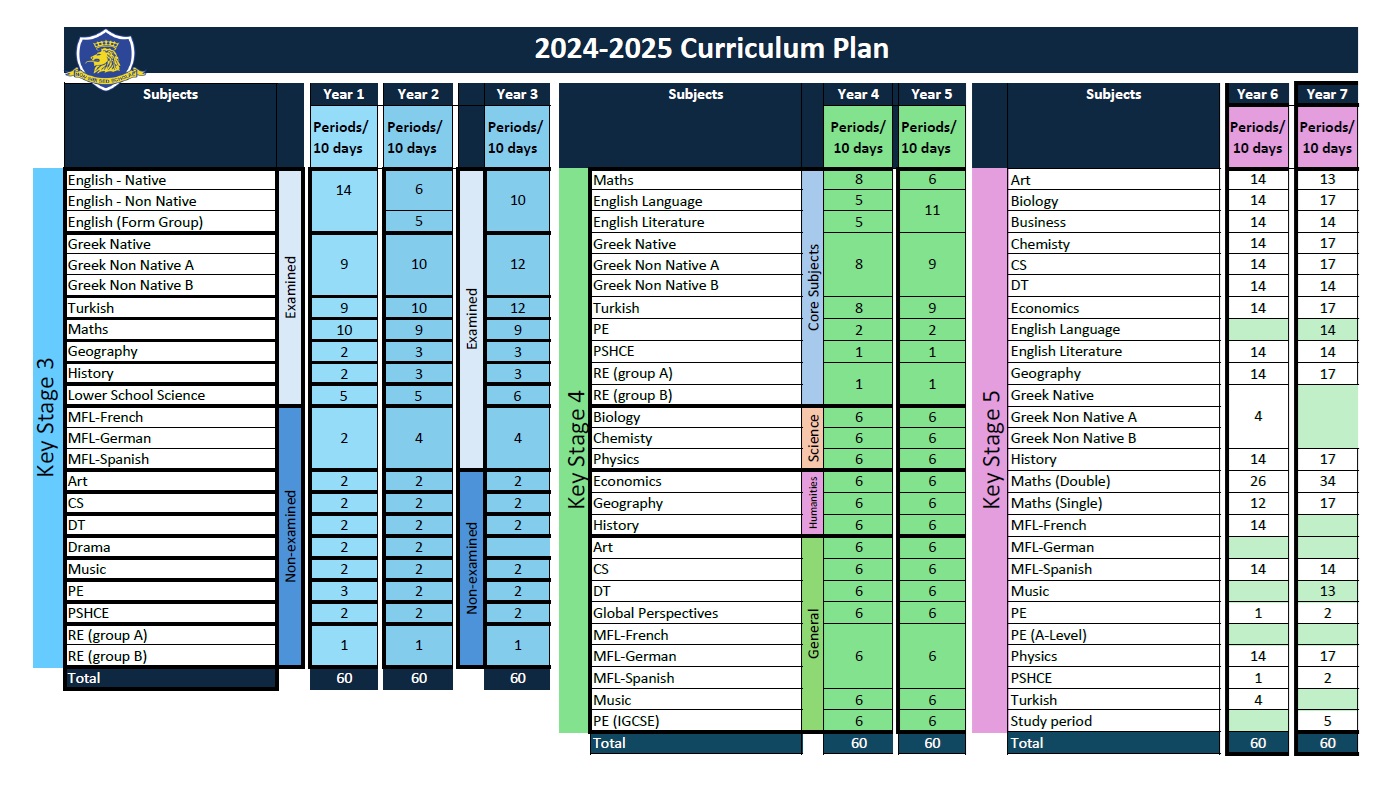The Curriculum at The English School
Overview
The curriculum is at the heart of teaching and learning at The English School, designed to meet the needs and maximize the potential of every student. The 2019 ISI report praised our curriculum for supporting academic excellence through rich and engaging educational experiences.
The School primarily follows the English National Curriculum. Upon entering at age twelve, all students follow a comprehensive study program that includes subjects such as English, Greek/Turkish, Maths, Science, History, Geography, Art, Music, ICT, Drama, and a Modern European language (French, German, or Spanish). Additionally, students participate in PSHCE and weekly games.
Curriculum Development
The curriculum for Years 1-3 is under review, with the first phase completed in June 2024. This rebalancing effort aims to strengthen students' progression to GCSE/IGCSE and A-level programs, address evolving student needs, and better prepare them for life and career readiness.
Year 4-7 Pathway
- Year 4: Students start nine GCSE/IGCSE courses, with compulsory subjects in English, English Literature, Maths, and Greek/Turkish. They select five additional subjects, with at least one from Humanities, Science, and another area.
- Years 6-7: Students move to A-level courses, studying four subjects at IAS level in Year 6 and typically three or four A-levels in Year 7. PSHCE studies continue, and the program has recently been updated to emphasize Relationships and Sex Education (RSE) as per Cyprus law.
Our curriculum is supported by specialist staff, many of whom hold a PGCE qualification and extensive teaching experience. The school’s robust staff development program ensures continued professional growth, enhancing educational impact.
Co-Curricular Activities
In addition to the formal curriculum, we offer diverse co-curricular activities for all years, enabling students to deepen existing interests and explore new perspectives.
The Mathematics Curriculum
Our Maths curriculum supports the English National Curriculum, promoting active learning, critical thinking, and problem-solving.
- Years 1-3: Maths courses focus on collaboration and active engagement.
- Years 3-4: Students study IGCSE Maths and sit exams at the end of Year 4.
- Year 5: The P1 course from IAS Maths and the AQA qualification are offered.
- Upper School (Years 6-7): Students complete the IAS and IAL maths specifications, with additional support for Double Maths students, including morning and afternoon sessions.
Mathematics Enrichment Program
Led by Mr. Andreas Demetriou, our enrichment program enhances problem-solving skills, targeting students in National and European Mathematics competitions.
Entry Criteria:
- 90% or above in the Maths Entrance exam, or
- 80% or above with a District Maths Competition or Maths Olympiad award.
Additional Opportunities
Students who achieve success in the District Maths Competition in November may also be invited to join.
Participants in the Maths Enrichment Program and Mathletes Club benefit from targeted support and competition preparation. The success of this program is evident: in 2023-2024, 33 students earned national competition awards, highlighting its effectiveness.
Our enrichment efforts continue to foster high achievement, with Mathletes Club success rates of 25%, 17%, and 17% for Years 1, 2, and 4, respectively.

The Apolytirion
The Apolytirion is a certificate of academic achievement awarded to Year 7 students and stamped by the Ministry of Education of the Republic of Cyprus. Many universities accept it as a standalone qualification, with approximately 70% of our students receiving at least one university offer that includes the Cyprus Apolytirion.
Issuance and Requirements
Students receive their Apolytirion at graduation. This certificate, marked out of 20, is issued just before the ceremony. To qualify, students must:
- Complete at least three GCE subjects at school in Year 7, attending all classes through the end of the academic year.
- Fulfill all assessments and sit the appropriate external examinations aligned with the school’s curriculum. Subjects not taught by the school cannot be included in the Ministry-endorsed Apolytirion.
- Participate, complete, and be assessed in the Year 7 PSHCE course.
The Apolytirion also reflects each student’s overall attendance percentage for Year 7.
Collection Details
Students will collect and sign for their Apolytirion one to two days before the Graduation Ceremony. If a certificate is not collected at that time, we will provide alternative collection days via email. Please note that certificates will not be available during the summer holidays.
Important Information
The Ministry of Education will endorse only one Apolytirion document per student. In the case of loss, a replacement can be issued, known as a Certificate of Graduation.
